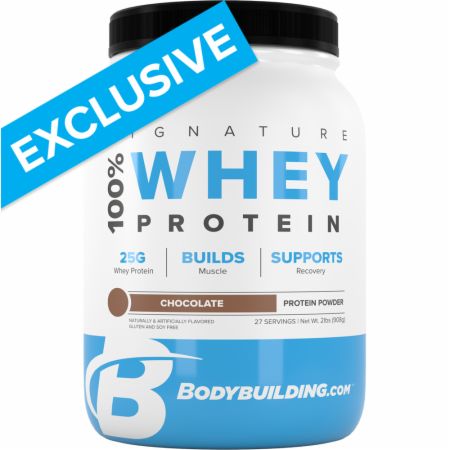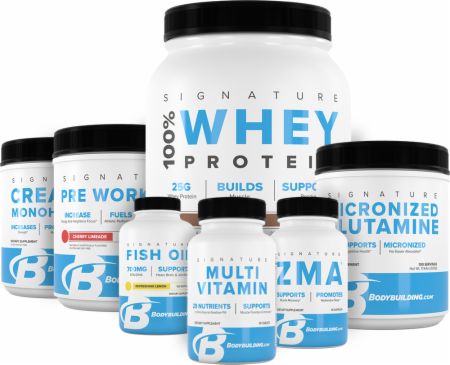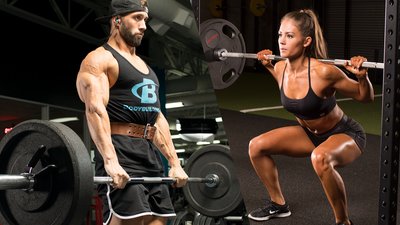Read most articles about gaining muscle, and you could be forgiven for assuming it's purely a male problem. With titles like "Get huge!" "Pack on the pounds!" or "Jack up your mass!" it's no wonder many women shy away.
In reality, having plenty of lean muscle mass benefits everyone. Men may want oversized biceps and meaty pecs, but plenty of women dream of adding lean mass in all the right places. I'm not talking about just fitness, figure, and bikini competitors, but anyone who wants that hard-body look—and who wants to live a long, functionally-capable life.
We posed questions about training, eating, and supplementation to two experts who have faced their own challenges in sculpting their awe-inspiring physiques: "The Quad Guy" Julian Smith and IFBB Bikini Pro Taylor Chamberlain.
What is the most important component of gaining muscle—the one thing you cannot skimp on or overlook?
Smith: Diet! You have to eat to grow, even if you have to supplement with powdered carbs or protein along the way. Skimp on your daily nutritional needs, miss your surplus intake, and you've missed your chance to gain muscle.
Chamberlain: Like Julian says—food, and lots of it. I used to be a hardgainer, but then I started tracking my macronutrients (carbs, protein, and fat) and slowly upping my intake from there. Before long, I realized I was getting all the energy I needed to completely demolish my workouts and fuel my muscle growth. From that point on, I kept my high-volume training—and started training heavier with lower reps, which really changed my physique. Building lean mass took a lot of time, but I finally started seeing desired changes.

Julian, was there one tweak or change you made to your own program back in the day that proved to be your key to getting bigger?
Smith: I definitely didn't have the information at my fingertips young people have access to today, but at the same time, I was never a hard-gainer. I knew nothing about flexible dieting. I just knew I needed to eat a surplus of calories. I ate an abundance of "clean" foods—chicken-and-rice-style meals—and completely overshot my intake. I gained a lot of excess body fat , but I don't regret it because it took place at an important stage in my lifting career. Those early gains were key to me building muscle, so I'm glad I was able to bulk up when I did.
The standard advice for gaining muscle is doing sets of 8-12 reps, pushing toward failure around that range. Do you agree with that, or do you favor another approach—maybe going heavier with lower reps, or pushing beyond 15 reps, or some sort of combination? What has worked best for you?
Smith: I've seen the best results by constantly varying my sets, reps, and tempo. The veteran bodybuilders at my gym would say, "Follow 3 sets of 10 for six weeks, then switch to low reps for six weeks." I tried that approach, but never got the results I've seen since I started varying my workout. I never hit the plateau people talk about because my body never had a chance to rest when I was using all those different rep ranges and tempos.

Chamberlain: I've seen the most results using both high-volume, lighter-weight workouts and heavier, low-rep workouts. What works best for me is to start my training sessions with heavier compound movements, then finish out with isolation, high-rep supersets.
Taylor, have you been successful targeting certain areas to develop without adding overall body weight? If so, what is the number one mistake to avoid to accomplish that?
Chamberlain: As a bikini competitor, my goal is to be proportionate, so one of the areas I'm working on is to build up my glutes and shoulders. I do that by training each group twice a week.
Right after I won my IFBB pro card at the 2017 NPC Universe Championships, I started "reverse dieting": adding calories to my diet, but doing it slowly over time so my body had time to process the new food. If I had just started adding more calories all at once, my body wouldn't have known how to metabolize it all. I also held onto my gains by slowly reducing the amount of cardio I was doing.
It's possible to stay lean while building muscle, but you have to add just a little bit of body fat to do it. You don't want to stay too lean or you end up in a situation in which your body is out of balance and not recovering or rebuilding muscle tissue.
So, yes, you might have to add some body fat to gain muscle, but you can still stay relatively lean.

Nutritionally, what are the foods you think are best suited to "fast-track" muscle gains?
Chamberlain: I'm a big fan of starchy carbs, such as jasmine rice and sweet potatoes; essential fatty acids, such as extra-virgin olive oil and coconut oil; and protein. My favorite protein sources are whey protein, egg whites, salmon, lean beef, and chicken.
Smith: I follow flexible dieting, so I don't categorize foods as being good or bad. If I'm looking to grow, I need to be in a caloric surplus. If I was the type of person who struggled to eat a lot, I would look to foods that would deliver my daily calories as efficiently as possible. These include calorie-dense foods such as fruit juice, peanut butter, or pasta. Contrary to what you read about a lot, fast-tracking your gains doesn't mean you have to hit the junk food aisle.
If the calorie surplus I'm trying to achieve isn't that big, and I'm trying to avoid gaining too much excess body fat, I'll gravitate toward voluminous foods that make me feel full without adding a lot of calories. Potatoes, rice, and salads that include lettuce and other green veggies are always welcome on my plate.

Have you ever used a weight-gainer product? Do you recommend that for those struggling to add size?
Smith: Absolutely. I've always said that whole foods are ideal, but if your goal is to put on size, you need to get your food in, every day, without fail—no matter what it takes. If you have a hard time consuming enough whole foods, a weight-gainer shake is going to be key. These quick meals are good to keep on hand for busy days or when you travel. And, thanks to all the extra calories they contain, they usually taste good and help you feel full.
Are there must-have supplements everyone should start with?
Smith: I'd say the most important supplement is a good protein powder! Protein is the building block to your bodybuilding success. No matter what your goal is, you have to hit your protein intake numbers each day, and having a supplement on hand makes it that much easier to reach your goal. I think Signature 100% Whey Protein is one of the better ones on the market.

Taylor, are there particular supplements you'd recommend to a woman who needed to add some muscle?
Chamberlain: I recommend creatine, a whey protein, fish oil, a multivitamin (because you need to keep micronutrients on point), and a carb powder for during workouts.
Any parting advice to help people stay on track?
Smith: Seeing people with great bodies on social media may be inspiring in one sense, but it can be discouraging, too. So many young people today think it's impossible for them to ever reach that level of fitness. It's easy to forget that those "perfect" bodies you see on Instagram were once in less-than-perfect shape. It's a fact of life—or at least of social media—that those pudgy "before" photos show up a lot less online than those chiseled "after" ones.
My advice is to put your blinders on, focus on your goals, and don't let outside influence and people who are well down the path dissuade you from continuing forward.





